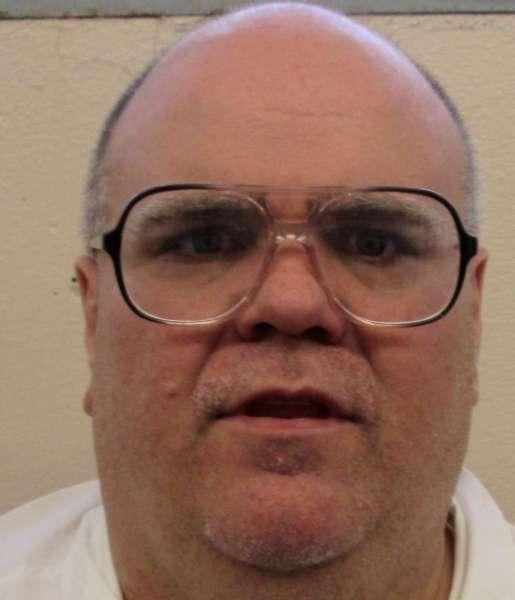Alan Eugene Miller, 57, was sentenced to death in 2000 for fatally shooting three people in a workplace rampage. Photo courtesy of Alabama Department of Corrections/
Website
Sept. 20 (UPI) -- A federal judge has awarded an Alabama death row inmate a temporary injunction that halts his execution by lethal injection after he accused the state of violating his constitutional right to die by an alternative method.
Alan Eugene Miller, 57, was sentenced to death in 2000 on charges of capital murder for killing three people in a workplace shooting rampage a year prior, and was scheduled earlier this year to die by lethal injection on Thursday.
Miller, however, asked the court on Sept. 1 to stop his execution on the grounds that he had elected in 2018 to die by nitrogen hypoxia, which is a method of execution that deprives the brain of oxygen by forcing inmates to breath only nitrogen.
The inmate argued that to die by any other means would violate his constitutional rights by treating him differently from similarly situated death row inmates and that to kill him by lethal injection would be "arbitrary and capricious."
The state countered it had no record of Miller's request. The Alabama Department of Corrections also told the court during litigation that if it enjoined Miller from dying by lethal injection that it was "very likely" that the department would not be prepared to execute him by nitrogen hypoxia on Thursday.
Judge Austin Huffaker Jr. of the U.S. District Court for the Middle District of Alabama, Northern Division, ruled in Miller's favor Monday, stating the inmate "has shown, based on the evidence presented, a substantial likelihood of success on the merits of his 14th Amendment claims, a likelihood of irreparable injury without an injunction and that the balance of harms weighs in his favor."
"Miller has established his entitlement to a preliminary injunction that prevents the State from executing him by any method other than nitrogen hypoxia," Huffaker wrote in his 61-page ruling.
During litigation, Miller presented what Huffaker described as "consistent, credible and uncontroverted direct evidence" that he had submitted -- and in a timely manner -- an election form to die by nitrogen hypoxia,
Meanwhile, the state presented the court with "inconsistent information" and has not said when it expects to be able to carry out executions by nitrogen hypoxia.
"Money would not remedy Miller's injury because his injury is not monetary," Huffaker wrote. "Rather, it is the loss of his 'final dignity' -- to choose how he will die."
Nitrogen hypoxia has never been used to execute a death row inmate in the United States, though the three states of Alabama, Oklahoma and Mississippi have authorized its use.
According to the Equal Justice Initiative, Miller's case is also the second time that Alabama has been forced to halt an execution due to the 2018 law that allowed inmates to elect to die by nitrogen hypoxia.
In 2019, Alabama withdrew its motion to set an execution date for Jarrod Taylor after he petitioned the court for an injunction on the ground that he had elected to die by the alternative method.
Miller was convicted of killing three people on Aug. 5, 1999.
Prosecutors said Miller shot dead two people at a Pelham heating and air-conditioning distributer where he worked as a driver. Then he drove five miles to a specialty gas distributor that had laid him off months earlier where he shot a third person dead.
The jury deliberated for 21 minutes in 2000 before convicting Miller on all three charges of capital murder.















